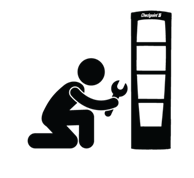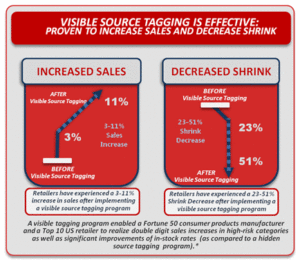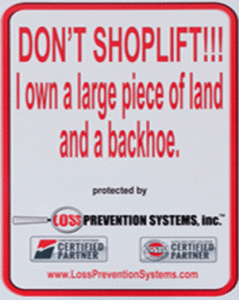 If you work in retail then you know theft is a big problem. The theft of supplies, merchandise, time and money are just a few of the things managers have to deal with daily. They have to address it on many fronts (i.e., impulse and professional shoplifters, employees and their friends and families, vendors).
If you work in retail then you know theft is a big problem. The theft of supplies, merchandise, time and money are just a few of the things managers have to deal with daily. They have to address it on many fronts (i.e., impulse and professional shoplifters, employees and their friends and families, vendors).
Unfortunately, these concerns aren’t going to go away. At this time, no one has a solution for stopping all forms of stealing. You can’t change human nature and some people are just going to be dishonest. That’s the bad news.
However, there’s some good news too. While you can’t completely stop it, there are ways you can prevent or minimize a lot of your loss due to theft. Loss – caused both externally and internally — can be decreased by making a few operational changes.
Here are 3 operational areas where you can make some headway in your on-going struggle against theft. If they seem like they’re “just common sense” you’re right, they are. But, there are a lot of managers and organizations out there who don’t do them — you probably know some.
Put the right person in the right job. We all do some things better than others; everyone has strengths and weaknesses. Putting people in positions they’re not trained to do or aren’t capable of doing affects the way they’re able to perform their job. Sink or swim is a destructive way to manage and it rarely works.
If a person is good with organization think about making them responsible for keeping a tight rein on your high-risk inventory. How about putting the out-going person in charge of greeting, engaging and monitoring customers on the floor?
Everyone is accountable for their job duties. Lack of accountability is one the biggest complaints people have with their jobs. Consequences for poor performance and behavior are some of the most effective deterrents to theft. Honest, responsible, motivated employees want to work in fair and equitable workplaces.
Prioritize effective communication. This is a simple, smart fix. Yet, most companies struggle with it. Billions of dollars have disappeared in a pocket or walked out a door because somebody didn’t: pass on important information, talk over a problem, speak up with a concern, get enough training, get the memo or listen well enough.
There are other operational ways to decrease internal and external theft. But, these 3 are a good place to start. If they are done well and consistently they might be all you need. If not, they’ll give you a good base on which to build further.
Nicole Abbott is a professional writer who’s had over 200 articles published. She’s a business consultant and former psycho-therapist with over 20 years of experience in mental health, business and addiction. She’s a coach, lecturer, trainer and facilitator. She has conducted over 200 workshops, trainings, presentations, seminars and college classes.
 Retail alarms are necessary to ensure a store is protected against break-ins and even theft from within. I know from personal experience that they work. As a Loss Prevention Manager I once had to respond to a burglary alarm when two young men threw a cement block through the front doors of my store in the middle of the night. I also responded to a number of false alarms due to system errors and failures. As a Manager On Duty I know that it can be stressful wondering if you locked all the doors and set the alarm at the end of the night. With those situations in mind, I would like to provide some practical tips to help avoid excessive false alarms and worry about building security.
Retail alarms are necessary to ensure a store is protected against break-ins and even theft from within. I know from personal experience that they work. As a Loss Prevention Manager I once had to respond to a burglary alarm when two young men threw a cement block through the front doors of my store in the middle of the night. I also responded to a number of false alarms due to system errors and failures. As a Manager On Duty I know that it can be stressful wondering if you locked all the doors and set the alarm at the end of the night. With those situations in mind, I would like to provide some practical tips to help avoid excessive false alarms and worry about building security. What can make life miserable for a Human Resources or Hiring Manager? In the right circumstances, a Loss Prevention Manager can be the cause of much consternation for a Human Resources Manager. When more than one employee is being apprehended or fired for theft at the same time it requires shifting schedules, moving people around and hiring new people to take the place of the employees being removed. What makes it even more difficult for a retail H.R. Manager is if the employees work in a specialized job function. I confess (with a smile on my face as I write this) that I was responsible more than once for putting a Human Resource Manager in this predicament during my Loss Prevention Manager career. Don’t misunderstand, I was not taking pleasure in the misery of the Human Resource Manager or the Department Manager, for that matter; I was enjoying closing an investigation that netted around five employees in total, three who worked in the one area.
What can make life miserable for a Human Resources or Hiring Manager? In the right circumstances, a Loss Prevention Manager can be the cause of much consternation for a Human Resources Manager. When more than one employee is being apprehended or fired for theft at the same time it requires shifting schedules, moving people around and hiring new people to take the place of the employees being removed. What makes it even more difficult for a retail H.R. Manager is if the employees work in a specialized job function. I confess (with a smile on my face as I write this) that I was responsible more than once for putting a Human Resource Manager in this predicament during my Loss Prevention Manager career. Don’t misunderstand, I was not taking pleasure in the misery of the Human Resource Manager or the Department Manager, for that matter; I was enjoying closing an investigation that netted around five employees in total, three who worked in the one area. A woman is fired by a grocery store chain after merging with another chain, and changing their shoplifting policy because she chased a shoplifter. Employees at the biggest retail store chased and killed a shoplifting man and now they faced murder charges.
A woman is fired by a grocery store chain after merging with another chain, and changing their shoplifting policy because she chased a shoplifter. Employees at the biggest retail store chased and killed a shoplifting man and now they faced murder charges.



 a good example using one of the newer clear, Checkpoint Systems stock labels. The trademarked “lock” and wording has been tested extensively.
a good example using one of the newer clear, Checkpoint Systems stock labels. The trademarked “lock” and wording has been tested extensively.

